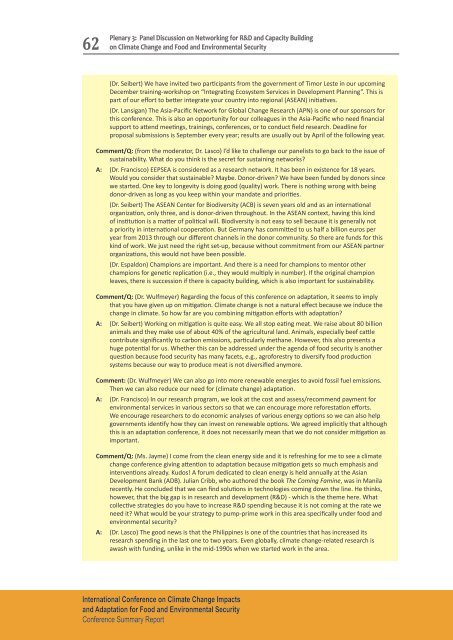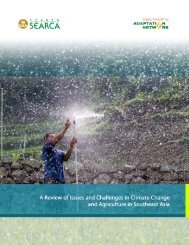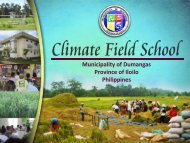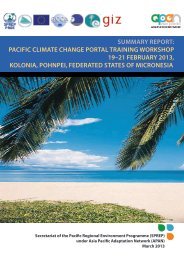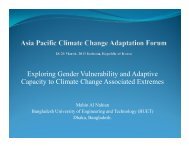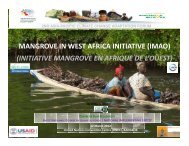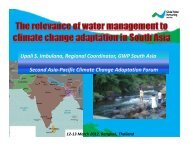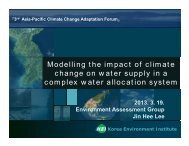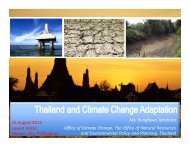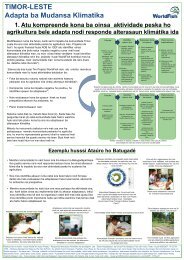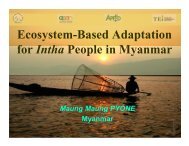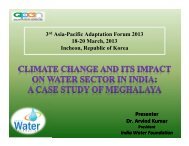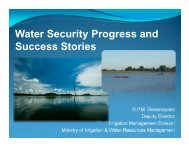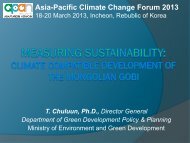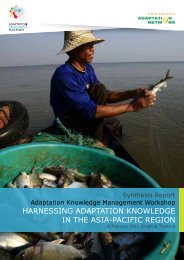PDF file (2.44 MB) - Asia Pacific Adaptation Network
PDF file (2.44 MB) - Asia Pacific Adaptation Network
PDF file (2.44 MB) - Asia Pacific Adaptation Network
You also want an ePaper? Increase the reach of your titles
YUMPU automatically turns print PDFs into web optimized ePapers that Google loves.
62Plenary 3: Panel Discussion on <strong>Network</strong>ing for R&D and Capacity Buildingon Climate Change and Food and Environmental Security(Dr. Seibert) We have invited two participants from the government of Timor Leste in our upcomingDecember training-workshop on “Integrating Ecosystem Services in Development Planning”. This ispart of our effort to better integrate your country into regional (ASEAN) initiatives.(Dr. Lansigan) The <strong>Asia</strong>-<strong>Pacific</strong> <strong>Network</strong> for Global Change Research (APN) is one of our sponsors forthis conference. This is also an opportunity for our colleagues in the <strong>Asia</strong>-<strong>Pacific</strong> who need financialsupport to attend meetings, trainings, conferences, or to conduct field research. Deadline forproposal submissions is September every year; results are usually out by April of the following year.Comment/Q: (from the moderator, Dr. Lasco) I’d like to challenge our panelists to go back to the issue ofsustainability. What do you think is the secret for sustaining networks?A: (Dr. Francisco) EEPSEA is considered as a research network. It has been in existence for 18 years.Would you consider that sustainable? Maybe. Donor-driven? We have been funded by donors sincewe started. One key to longevity is doing good (quality) work. There is nothing wrong with beingdonor-driven as long as you keep within your mandate and priorities.(Dr. Seibert) The ASEAN Center for Biodiversity (ACB) is seven years old and as an internationalorganization, only three, and is donor-driven throughout. In the ASEAN context, having this kindof institution is a matter of political will. Biodiversity is not easy to sell because it is generally nota priority in international cooperation. But Germany has committed to us half a billion euros peryear from 2013 through our different channels in the donor community. So there are funds for thiskind of work. We just need the right set-up, because without commitment from our ASEAN partnerorganizations, this would not have been possible.(Dr. Espaldon) Champions are important. And there is a need for champions to mentor otherchampions for genetic replication (i.e., they would multiply in number). If the original championleaves, there is succession if there is capacity building, which is also important for sustainability.Comment/Q: (Dr. Wulfmeyer) Regarding the focus of this conference on adaptation, it seems to implythat you have given up on mitigation. Climate change is not a natural effect because we induce thechange in climate. So how far are you combining mitigation efforts with adaptation?A: (Dr. Seibert) Working on mitigation is quite easy. We all stop eating meat. We raise about 80 billionanimals and they make use of about 40% of the agricultural land. Animals, especially beef cattlecontribute significantly to carbon emissions, particularly methane. However, this also presents ahuge potential for us. Whether this can be addressed under the agenda of food security is anotherquestion because food security has many facets, e.g., agroforestry to diversify food productionsystems because our way to produce meat is not diversified anymore.Comment: (Dr. Wulfmeyer) We can also go into more renewable energies to avoid fossil fuel emissions.Then we can also reduce our need for (climate change) adaptation.A: (Dr. Francisco) In our research program, we look at the cost and assess/recommend payment forenvironmental services in various sectors so that we can encourage more reforestation efforts.We encourage researchers to do economic analyses of various energy options so we can also helpgovernments identify how they can invest on renewable options. We agreed implicitly that althoughthis is an adaptation conference, it does not necessarily mean that we do not consider mitigation asimportant.Comment/Q: (Ms. Jayme) I come from the clean energy side and it is refreshing for me to see a climatechange conference giving attention to adaptation because mitigation gets so much emphasis andinterventions already. Kudos! A forum dedicated to clean energy is held annually at the <strong>Asia</strong>nDevelopment Bank (ADB). Julian Cribb, who authored the book The Coming Famine, was in Manilarecently. He concluded that we can find solutions in technologies coming down the line. He thinks,however, that the big gap is in research and development (R&D) - which is the theme here. Whatcollective strategies do you have to increase R&D spending because it is not coming at the rate weneed it? What would be your strategy to pump-prime work in this area specifically under food andenvironmental security?A: (Dr. Lasco) The good news is that the Philippines is one of the countries that has increased itsresearch spending in the last one to two years. Even globally, climate change-related research isawash with funding, unlike in the mid-1990s when we started work in the area.International Conference on Climate Change Impactsand <strong>Adaptation</strong> for Food and Environmental SecurityConference Summary Report


